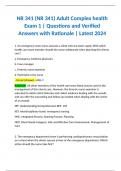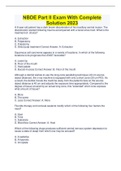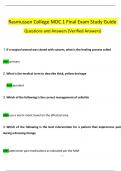Exam (elaborations)
[Answered} Organic Chemistry ACS Exam Set 2024 Compprehensive Questions and Answers Latest 2024
- Course
- ACS Organic Chemistry (ACS)
- Institution
- Pennfoster College
[Answered} Organic Chemistry ACS Exam Set 2024 Compprehensive Questions and Answers Latest 2024Organic Chemistry ACS, Organic Chemistry - ACS Final, Organic Chemistry 2 ACS Final, Organic Chemistry 1 ACS Questions Final Exam
[Show more]












